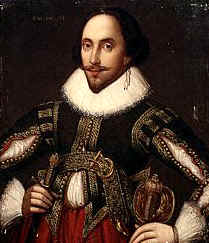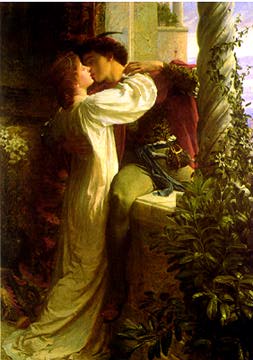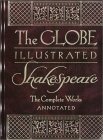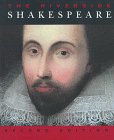|
The father of tears and laughter
Thou didst drink the stale of horses and the guilded puddle which beasts would cough at
 England's greatest poet and playwright was born at Stratford-upon-Avon, the son of a tradesman and Alderman of Stratford, John Shakespeare in 1564. William, the eldest son, and third child (of eight) was baptised on 26th April 1564 and probably educated at Stratford Grammar School, but little is known of his life up to his eighteenth year. He did not go to University and his younger contemporary and fellow-dramatist, Ben Johnson, would later speak disparagingly of his "small Latin, and less Greek" in the eulogy prefaced to the Firs Folio. However the Grammar School curriculum would have provided a formidable linguistic, and to some extent literary, education.
England's greatest poet and playwright was born at Stratford-upon-Avon, the son of a tradesman and Alderman of Stratford, John Shakespeare in 1564. William, the eldest son, and third child (of eight) was baptised on 26th April 1564 and probably educated at Stratford Grammar School, but little is known of his life up to his eighteenth year. He did not go to University and his younger contemporary and fellow-dramatist, Ben Johnson, would later speak disparagingly of his "small Latin, and less Greek" in the eulogy prefaced to the Firs Folio. However the Grammar School curriculum would have provided a formidable linguistic, and to some extent literary, education.
Although, in 1575 when he was eleven, there was a great plague in the country and Queen Elizabeth journeyed out of London to avoid its consequences and stayed for several days at Kenilworth Castle near Stratford enjoying "festivities" arranged by her host Lord Leicester. It is probable these events may have made a strong impact on the mind of young William.
At the age of Eighteen, he married Anne Hathaway, eight years his senior. Five years later he left for London. William worked at the Globe Theatre and appeared in many small parts. He first appeared in public as a poet in 1593 with his Venus and Adonis and the following year with The Rape of Lucrece. He became joint proprietor of The Globe and also had an interest in the Blackfriars Theatre.
The play writing commenced in 1595 and of the 38 plays that comprise the Shakespeare Cannon, 36 were published in the 1st Folio of 1623, of which 18 had been published in his lifetime in what are termed the Quarto publications.
Love's Labour's Lost and The Comedy of Errors appear to be among the earliest, being followed by The Two Gentlemen of Verona and Romeo and Juliet. Then followed Henry VI, Richard III, Richard II, Titus Andronicus, The Taming of the Shrew, King John, The Merchant of Venice, A Midsummer Night's Dream, All's Well that Ends Well, Henry IV, The Merry Wives of Windsor, Henry V, Much Ado about Nothing, As you like it, Twelth Night, Julius Caesar, Hamlet, Troilus and Cressida, Othello, Measure for Measure, Macbeth, King Lear, Timon of Athens, Pericles, Antony and Cleopatra, Coriolanus, Cymbeline, A Winter's Tale, The Tempest, Henry VIII and The Two Noble Kinsmen.
When he retired from writing in 1611, he returned to Stratford to live in a house which he had built for his family. His only son, Hamnet died when still a child. He also lost a daughter Judith (twin to Hamnet), but his third child Susanna married a Stratford Doctor, John Hall and their home "Hall's Croft" is today preserved as one of the Shakespeare Properties and administered by the Shakespeare Birthplace Trust.
In 1616 Shakespeare was buried in the Church of the Holy Trinity the same Church where he was baptised in 1564. Tradition has it that he died after an evening's drinking with some of his theatre friends.
His gravestone bears the words:-
|
Good frend for Jesus sake forebeare,
to digg the dust encloased heare,
Bleste be ye man yt spares thes stones,
And curst be he yt moves my bones.
|


|








 View great Shakespeare movies
View great Shakespeare movies 

